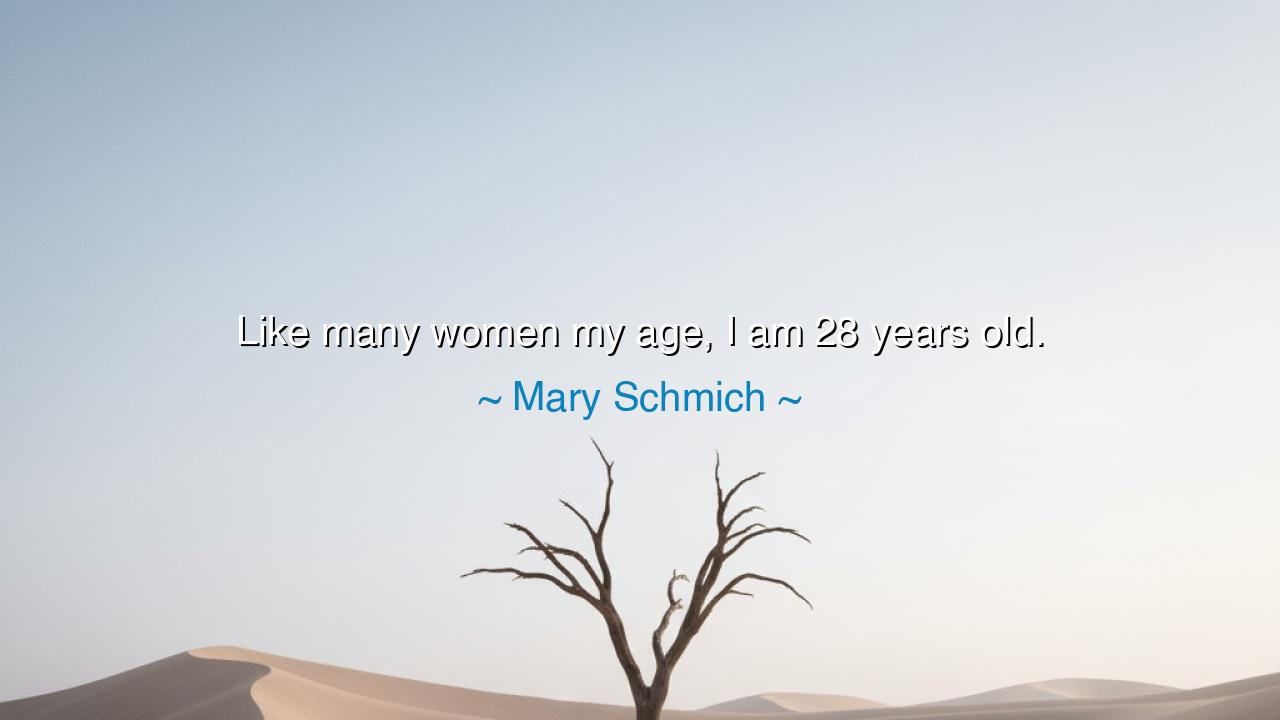
Like many women my age, I am 28 years old.






In the great tapestry of time, there are moments when words come forth, seemingly simple, but carrying with them the weight of wisdom. Mary Schmich, in her light-hearted yet profound way, offered a curious observation that echoes deeper truths: “Like many women my age, I am 28 years old.” At first glance, this statement may seem to be merely a humorous comment, but it is, in fact, a reflection on the nature of identity, the complexities of age, and the expectations placed upon women by society. In these words lies an exploration of the self, the contradictions we carry, and the timeless struggle to define our place in the world.
What, then, does Schmich mean when she says, “Like many women my age”? Here, she touches upon a universal truth—the ways in which society attempts to categorize and define us by our age, our gender, and the roles we are expected to fulfill. The number 28 becomes a symbol, a threshold marking a moment in life that carries expectations both external and internal. 28 years old—it is an age that sits between the vitality of youth and the reflection of maturity. A woman of this age finds herself at the crossroads of dreams yet unfulfilled and accomplishments yet to come. But Schmich turns this expectation on its head, humorously acknowledging the complexity of her age while still embracing the layers of self she has cultivated.
In ancient times, age was often seen not as a number, but as a badge of experience—a marker of the wisdom accumulated through the trials of life. Think of the philosophers of Greece, whose age was not determined by how many years had passed, but by the depth of their insight and the knowledge they shared. Socrates, for instance, did not consider himself wise simply because he had lived many years; rather, it was his relentless pursuit of truth, the questions he asked, and the lessons he learned that defined his wisdom. Schmich’s words remind us that age is not a rigid measure—it is a fluid concept, shaped by personal growth, experience, and the self-awareness we cultivate over time.
Consider, too, the life of Queen Elizabeth I, who ascended to the throne at a young age, facing the weight of an entire nation upon her shoulders. At 28, she was already a monarch, a leader, and a symbol of strength and determination. Her age was no longer simply a number; it became a measure of the decisions she made, the alliances she formed, and the legacy she created. Yet, she too struggled with the expectations placed upon her as a woman in power, forced to reconcile her femininity with her role as a ruler. Elizabeth’s story shows that age is not merely about how long we have lived, but how we live, and how we rise to meet the challenges of our time.
In Schmich’s playful statement, she acknowledges a deep truth: that women, especially, are often defined by their age—and more specifically, by the expectations others place upon them. At 28, a woman is caught in the delicate balance between youth’s promise and the societal pressure to prove her worth, her success, and her potential. Schmich humorously sidesteps this tension, embracing her age while subtly pushing back against the limitations that society often tries to impose. Her words remind us that identity cannot be confined to the number of years we have lived. Identity is something much deeper—it is an ever-evolving force shaped by our choices, our experiences, and our vision of who we wish to become.
The lesson here is clear: age is but a number—a simple marker in the ever-flowing river of time. To define ourselves solely by our age is to miss the richness of who we truly are. It is in the choices we make, the lives we touch, and the lessons we learn that our true age is found. So, let us not be bound by the expectations of others or by the number of years that have passed. Let us celebrate each moment of growth, each new layer of understanding, and each new version of ourselves that emerges as we journey through life.
Therefore, let us take Schmich’s words to heart. Let us embrace our age with humor and grace, recognizing that it is not a defining feature, but a part of the ever-unfolding story of who we are. Let us seek to define ourselves not by the number of years we have lived, but by the depth of the life we lead, the truths we discover, and the joy we bring to the world. And in this way, we will not only age, but grow—growing into the fullest, most authentic versions of ourselves.






AAdministratorAdministrator
Welcome, honored guests. Please leave a comment, we will respond soon